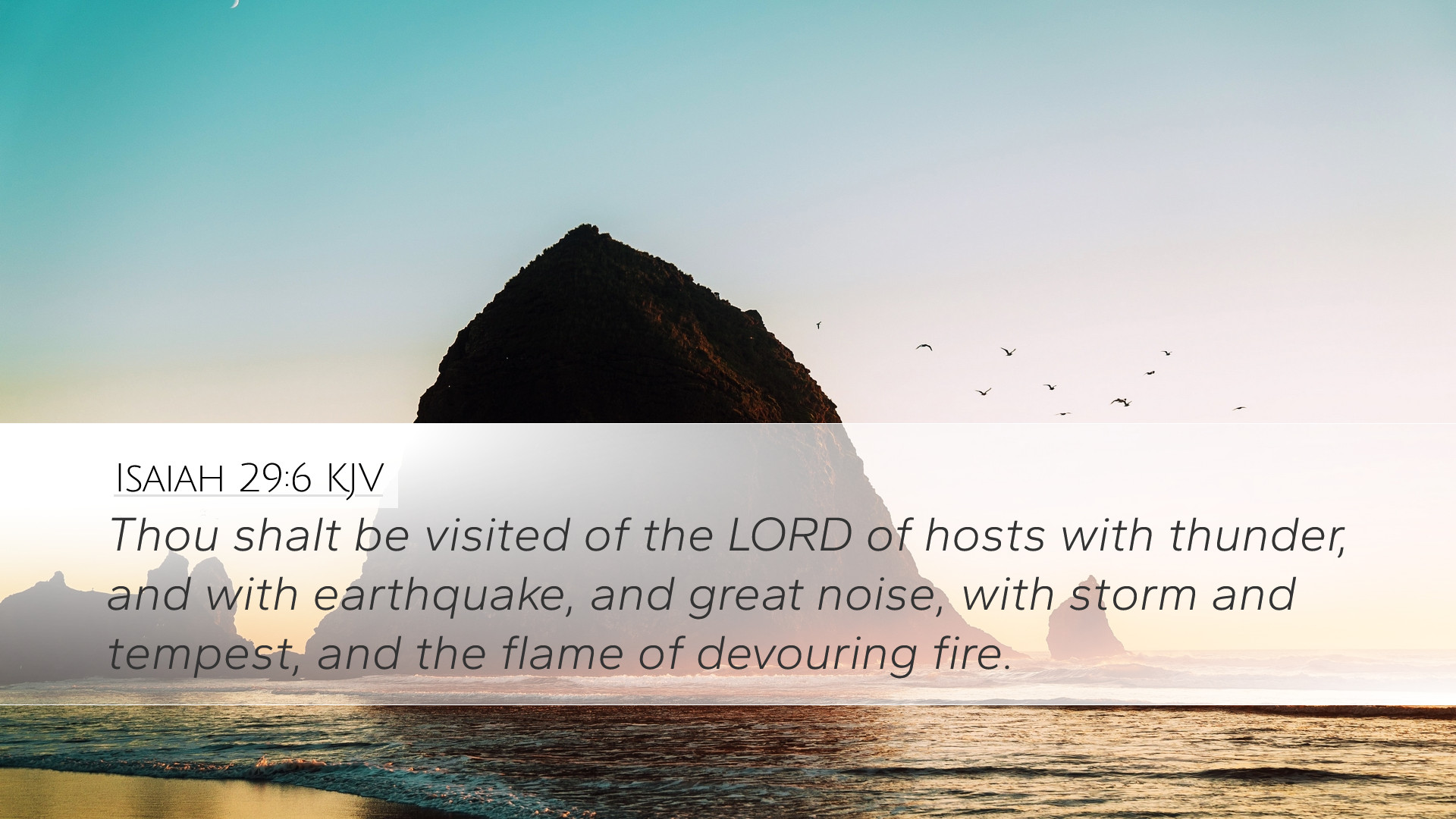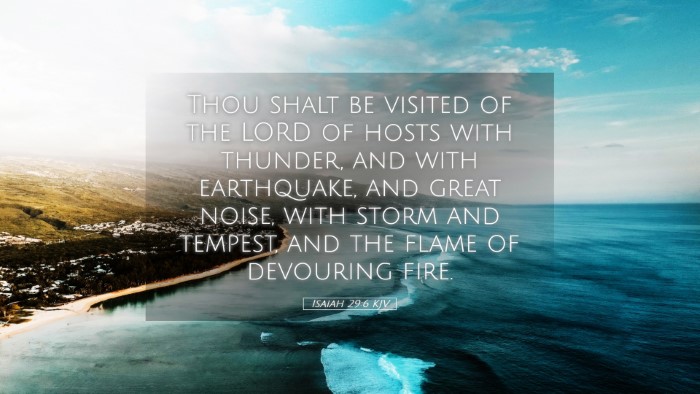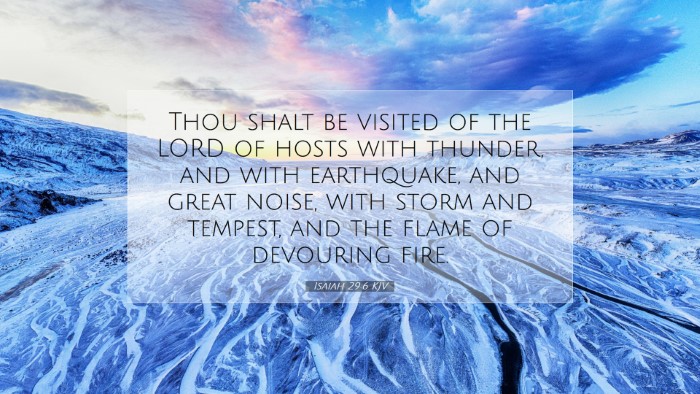Commentary on Isaiah 29:6
Isaiah 29:6 states, "You will be visited by the Lord of hosts with thunder, and with earthquake, and great noise, with storm and tempest, and the flame of devouring fire." This verse depicts a moment of divine intervention and judgment, underscoring the serious nature of God's dealings with His people. Below, we explore insights from esteemed public domain commentaries, offering a comprehensive understanding of this passage.
Contextual Overview
The chapter of Isaiah 29 opens with a prophecy against Jerusalem, often referred to as 'Ariel,' which means 'Lion of God' or 'Altar Hearth.' The preceding verses reveal God's intention to humble the pride of Jerusalem, as well as a call to repentance and returning to righteousness. This verse encapsulates the impending judgment that will be executed through natural calamities, symbolizing God's displeasure toward hypocrisy and spiritual blindness.
Insights from Matthew Henry
Matthew Henry's commentary on Isaiah 29:6 emphasizes the decisive nature of God's visitation. He notes:
- The Sovereign Power of God: Henry asserts that God’s sovereignty is manifested through His ability to command nature, using thunder, earthquakes, and fire as His instruments of discipline. This demonstrates His ultimate control over creation.
- Divine Judgment: He highlights that these manifestations are not mere expressions of anger but serve a higher purpose of correction. The God of hosts is portrayed as a warrior who defends the righteous and punishes the wicked.
- Awakening to Reality: The tumultuous events serve to awaken the people from their spiritual slumber, encouraging them to recognize their need for God amidst their false security. Such acts are a call to true repentance.
Insights from Albert Barnes
Albert Barnes provides an in-depth analysis of the imagery used in this verse. He explains:
- The Symbolism of Thunder and Earthquake: Barnes interprets these phenomena as symbolic of God’s power and presence. The 'thunder' indicates the announcement of God’s approach, while 'earthquake' symbolizes the instability and fear that comes with divine judgment.
- Implications for Israel: He suggests that this visitation is dire for Israel, portraying it as both a rebuke and a reminder of their covenant responsibilities. The natural disasters serve to dismantle their false hopes in human strength and wisdom.
- The Call to Awareness: Barnes stresses that this verse serves as a wake-up call for the people, urging them to understand the seriousness of their transgressions and prompting a response to the divine message being delivered.
Insights from Adam Clarke
Adam Clarke’s commentary on Isaiah 29:6 adds further depth to the interpretation:
- The Nature of the Visitation: Clarke describes this visitation as a multifaceted approach of God dealing with His people—not limited to one form of judgment or revelation. He emphasizes the breadth of God's capabilities in response to human disobedience.
- Historical Context: He references historical events that align with this prophecy, indicating that the literal fulfillments remind readers of God’s consistent nature to intervene in human affairs. Clarke notes that such judgments have precedent in Israel’s history.
- Restorative Purpose: Ultimately, Clarke highlights that while the verse describes severe judgments, it also serves the purpose of restoration—if the people heed the warnings and turn back to God, they may find mercy.
Theological Implications
This verse is rich with theological implications:
- The Reality of Divine Judgment: The imagery of natural disasters as instruments of judgment propels the notion that God is not indifferent to human affairs. His holiness and justice demand a response to sin.
- God’s Presence in Crisis: Isaiah 29:6 illustrates that even in calamities, God is present. This serves to remind believers that circumstances can either be seen as punitive or as a divine invitation to seek reconciliation with God.
- Call to Immediate Repentance: The urgency in this verse reflects the need for immediate action—turning from sin and recognizing God’s authority. It calls believers today to reevaluate their spiritual state amidst worldly distractions.
Application for Today
For pastors, students, and theologians, Isaiah 29:6 provides critical insights for contemporary faith practice:
- Encouragement for Faithfulness: This passage serves as a reminder to maintain faithfulness during trials, understanding that God might be allowing difficulties to draw one closer to Him.
- Understanding God's Sovereignty: It helps believers comprehend the magnitude of God's power over creation, inspiring awe and reverence for His divine authority in every aspect of life.
- Call to Social Responsibility: The call for repentance extends beyond individual believers—it encompasses communities and nations. There exists a responsibility to advocate for justice and righteousness in a world often characterized by moral decay.
Conclusion
Isaiah 29:6 serves as a profound reminder of God’s active role in the world. Through the insights gathered from Matthew Henry, Albert Barnes, and Adam Clarke, we gain a clearer understanding of the gravity of divine judgment, the importance of repentance, and the assurance of God’s presence even in times of distress. This passage should motivate contemporary believers to engage deeply with their faith, ensuring their lives reflect the glory and holiness of the God who tirelessly calls them back to Himself.


